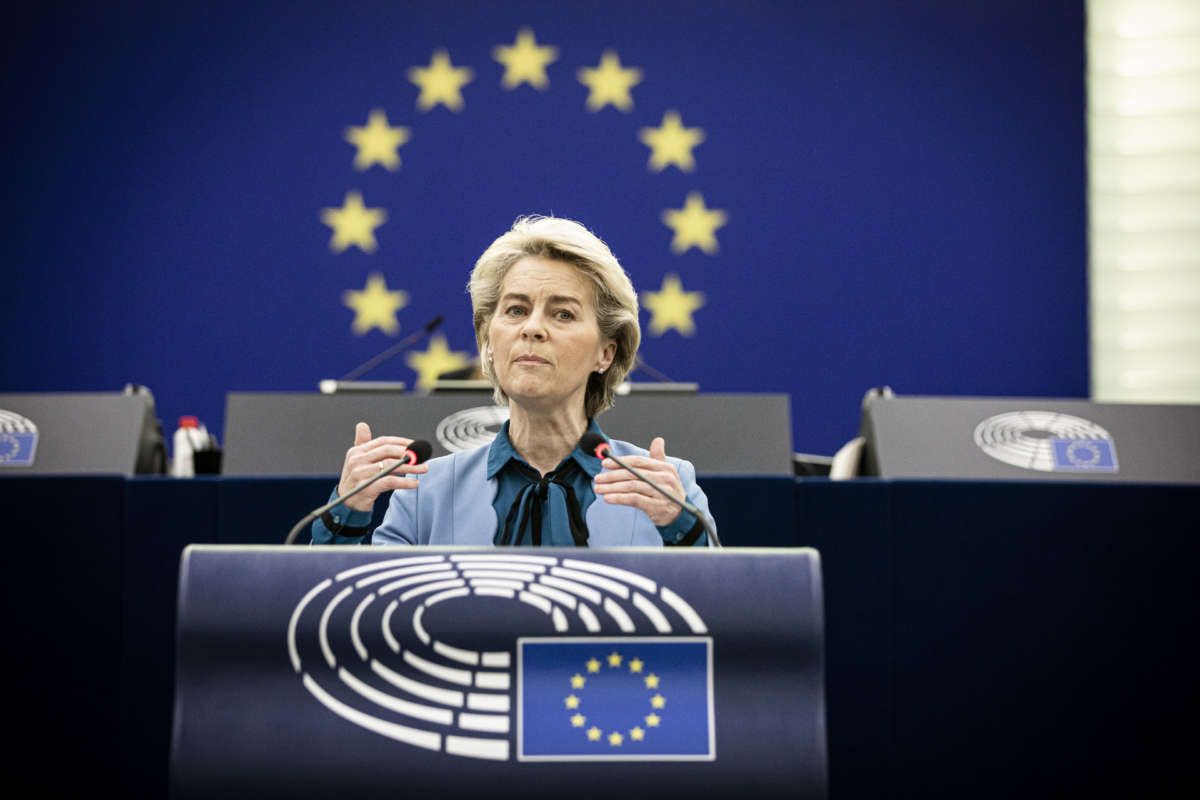The head of the European Commission on Friday defended coronavirus-related intellectual property protections as “precious” after South Africa’s president reiterated his support for a temporary patent waiver, arguing the step is necessary to ramp up vaccine production on the African continent.
Speaking at the E.U.-African Union summit in Brussels, European Commission President Ursula von der Leyen argued that instead of suspending vaccine-related intellectual property protections, world leaders should focus on technology transfer and compulsory licensing — a more narrow approach that public health experts and campaigners have long rejected as inadequate.
“Here I think we can find a bridge,” said von der Leyen, whose communications with and ties to the pharmaceutical industry have come under growing scrutiny in recent weeks.
Von der Leyen’s comments came minutes after South African President Cyril Ramaphosa insisted that efforts to develop mRNA-based coronavirus vaccines on the African continent have “been hampered by intellectual property barriers” established under the World Trade Organization’s TRIPS Agreement.
To date, Africa has been forced to import 99% of its coronavirus vaccines. According to the World Health Organization (WHO), more than 80% of Africa’s population has yet to receive a single coronavirus vaccine dose.
“This for us is a serious matter,” said Ramaphosa, who warned that IP protections could undermine the work of a WHO-backed technology transfer hub in South Africa, which has created an mRNA vaccine using Moderna’s coronavirus shot as a model.
On Friday, the WHO announced that six African countries — Egypt, Kenya, Nigeria, Senegal, South Africa, and Tunisia — will be the first recipients of mRNA technology from the Cape Town hub, which expects safety trials for the new mRNA vaccine to begin later this year.
“This announcement marks a welcome milestone on the road to expanding vaccine manufacturing capacity in lower- and middle-income countries,” Kate Stegeman, advocacy coordinator with the Médecins Sans Frontières Access Campaign, said in a statement. “It’s encouraging to see the mRNA technology transfer hub getting closer to developing and validating the world’s first open-access mRNA vaccine production platform.”
But in the absence of an IP waiver, the burgeoning tech-transfer initiative could face legal challenges from pharmaceutical giants such as Moderna, which has been granted at least three mRNA vaccine patents in South Africa. The company has thus far refused to cooperate with the WHO’s mRNA hub, which is currently working with facilities in Argentina and Brazil in an effort to further expand vaccine production capacity across the Global South.
Stéphane Bancel, Moderna’s billionaire CEO, told Reuters Thursday that his firm has “not decided yet” whether it will enforce its patents in low- and middle-income countries once it deems the global pandemic over.
Edwin Ikhuoria, the ONE Campaign’s Africa executive director, argued that a “blanket IP waiver, right now, is the only guarantee that people will not sue.”
During his remarks at the E.U.-Africa summit on Friday, Ramaphosa said that “governments that are really serious about ensuring that the world has access to vaccines should ensure that we approve the TRIPS waiver as we have put forward, rather than hide behind IP, the profitability of originators.”
The waiver proposal has been stuck in largely fruitless WTO negotiations since October 2020 due to opposition from rich nations, including Germany and other powerful E.U. member countries. The Biden administration has also faced criticism for taking a passive approach to WTO negotiations after endorsing the proposed patent waiver last year.
“We are facing a global pandemic, a global pandemic that will stay with us for a long time,” said Ramaphosa. “And all that has been asked for is that a TRIPS waiver should be done within a set period of time so as to enable those countries that do not have easy access to vaccines to have access to vaccines.”
“We are talking about the lives of millions, hundreds of millions, of people rather than the profitability of the few companies,” he continued. “It is not acceptable that Africa is consistently at the back of the queue in relation to access to medicines. While we appreciate the donations, they are never a sustainable way or mechanism to build resilience. Help to empower us, let us tackle obstacles together.”
Speaking against the authoritarian crackdown
In the midst of a nationwide attack on civil liberties, Truthout urgently needs your help.
Journalism is a critical tool in the fight against Trump and his extremist agenda. The right wing knows this — that’s why they’ve taken over many legacy media publications.
But we won’t let truth be replaced by propaganda. As the Trump administration works to silence dissent, please support nonprofit independent journalism. Truthout is almost entirely funded by individual giving, so a one-time or monthly donation goes a long way. Click below to sustain our work.
